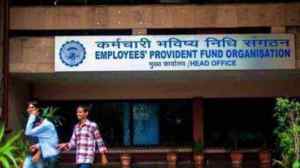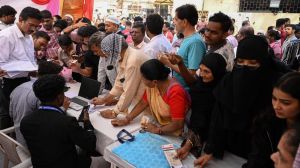The morality tamasha
Even as Maharashtra was reverberating with the sound and fury of a possible revolt in the Shiv Sena, which finally proved to be a damp squib...

Even as Maharashtra was reverberating with the sound and fury of a possible revolt in the Shiv Sena, which finally proved to be a damp squib, the secretaries in the home ministry were busy drafting a bill to ban dance bars. If indeed the Shiv Sena was to split, it could lead to mayhem and murder because both the groups in question have thrived on terror. No other party has as effectively used terror as an instrument of building the organisation. At times, the Sena waved the banner of militant Hinduism, targeting Muslims. At other times it marched on the streets, shouting violent slogans against the non-Marathis. The Sena would get tacit support of the sangh parivar on the so-called moral issues, be it the campaign against the film Fire, or its attacks on Girlfriend. It is ironical, therefore, that neither RSS nor Shiv Sena is campaigning for the ban on dance bars or demanding a dress code for girls in colleges.
The banner for moral rearmament has been raised by Sharad Pawar8217;s Nationalist Congress Party. Deputy Chief Minister R.R. Patil, who also holds charge of the home ministry, has taken on the role of moral crusader. The sudden realisation by Patil and Co., that dance bars are corroding the moral fibre of society and by vice-chancellors and principals in the state that the dress of girl students constituted a social danger, is intriguing.
No party in the state, certainly not the NCP, had even mentioned these issues in their manifestoes, nor did they raise them in public. Dance bars have spread in the state in the last decade. But so have pubs and discos, frequented by young boys and girls. The so called 8220;permit rooms8221; have become permanent fixtures in all the cities and emerging towns. There was no public demand nor any demonstrations by women8217;s organisations to ban dance bars. Even today, feminists are not united on the issue. Indeed, the men who never visit dance bars wonder how it is that the red light area is bustling with activity while morality is being enforced only on the dance bar. Patil is right when he says dance bars are visited mainly by men with black money. But in that case, these men should be apprehended, not the bar girls or bar owners. Further, it is no secret that law enforcing authorities have either a direct stake in the business of bars or indirectly sanction everything that goes on there in the name of entertainment.
Patil knows that almost all the court judgments so far have gone against such bans because the proponents of the ban could not define the distinction between the dance bar and the tamasha, glorified as folk art. He is also aware that not all his comrades are with him in his crusade. The Congress too is not keen to support him. But the Congress does not want to be seen as a party endorsing the 8220;immoral8221; dance bars. So, it is hedging its bets. That is why Governor S.M. Krishna returned the ordinance and asked the government to draft a bill. It may also be noted here that no party in the House may be able to oppose the bill, clearly and publicly, once it is framed.
Be that as it may, what needs to be understood is why Patil is so insistent and what is his personal or political agenda. Sharad Pawar, his mentor and leader, has not made any statement on the issue. He, too, is playing it safe. If Patil fails to implement his ideas, Pawar will treat it as the Dy CM8217;s faux pas. Should he succeed, Pawar will like to be seen as the leader who masterminded the moral operation.
Yet the question still remains: why did Patil take upon himself the role of the Moral Police Commissioner of the state? For that, it would help to look into the nature of the NCP. The party is more like an elite club of Maratha barons. Individually, they command the district in which they have built a small empire or inherited it. These fiefdoms include sugar factories, insolvent now, but wielding a lot of power. There are cooperative banks, most of them in red, which have obliged a large of number of locals, even as the directors have fleeced them. There are schools and colleges, wherein teachers and staff are like bonded labour. There are wholesale markets and retail outlets which are controlled by them. Almost all these satraps locally operate like dons though they are small in size at the state level. Only when they formed a club with a brand name, NCP, and a brand leader, Sharad Pawar, could they collectively become a force. Despite this force, Pawar surrendered chief ministership to Congress not because he was generous but because he could not have chosen a candidate from the warring satraps who was acceptable to all. The next contentious issue was choosing the candidate for the next powerful post of deputy chief minister. Chhagan Bhujbal was out of the race ostensibly because his name was tarnished by the Telgi affair. Pawar, then, decided to hold a poll within the party.
Pawar himself tacitly supported the candidature of R.R. Patil, perhaps because he is not an established satrap and would not go to war with other satraps. In the process, the bigger warlords were defeated in the intra-party poll. R.R. alias Aba, was no popular figure. He had come to prominence on the controversy over James Lane allegedly maligning the image of Chhatrapati Shivaji Maharaj in his book. The state elections were partly fought on that issue but Patil did not get much mileage in that campaign, personally or politically. Patil has an image of an honest and unassuming man. With the dance bar campaign now, he has become a hero in the middle class. He has overtaken the chief minister in the image contest. Having realised the importance of the moral issue, he has cast himself in the larger than life role of a Braveheart fighting the 8220;evil forces represented and led by the vicious dance bar owners8221;.
The NCP has also begun to see an advantage in the campaign. It was always a party of the mofussil and rural areas. With this campaign, which has snowballed into universities and colleges in the form of dress codes, the NCP feels it has endeared itself to that elusive urban middle class which often backed the sangh parivar on the 8216;8216;moral8217;8217; questions. Therefore, now the so-called moral policing has acquired a sharp political colour with an electoral dimension. An year from now, there would be an election for the Mumbai Corporation, in which the NCP will be a major contender. With the sangh parivar confused and the Shiv Sena still under shock of a revolt that never took place, the NCP will be the beneficiary. It plans to claim the political as well as 8216;8216;moral8217;8217; space.
The writer is editor,Loksatta8217;
- 01
- 02
- 03
- 04
- 05































